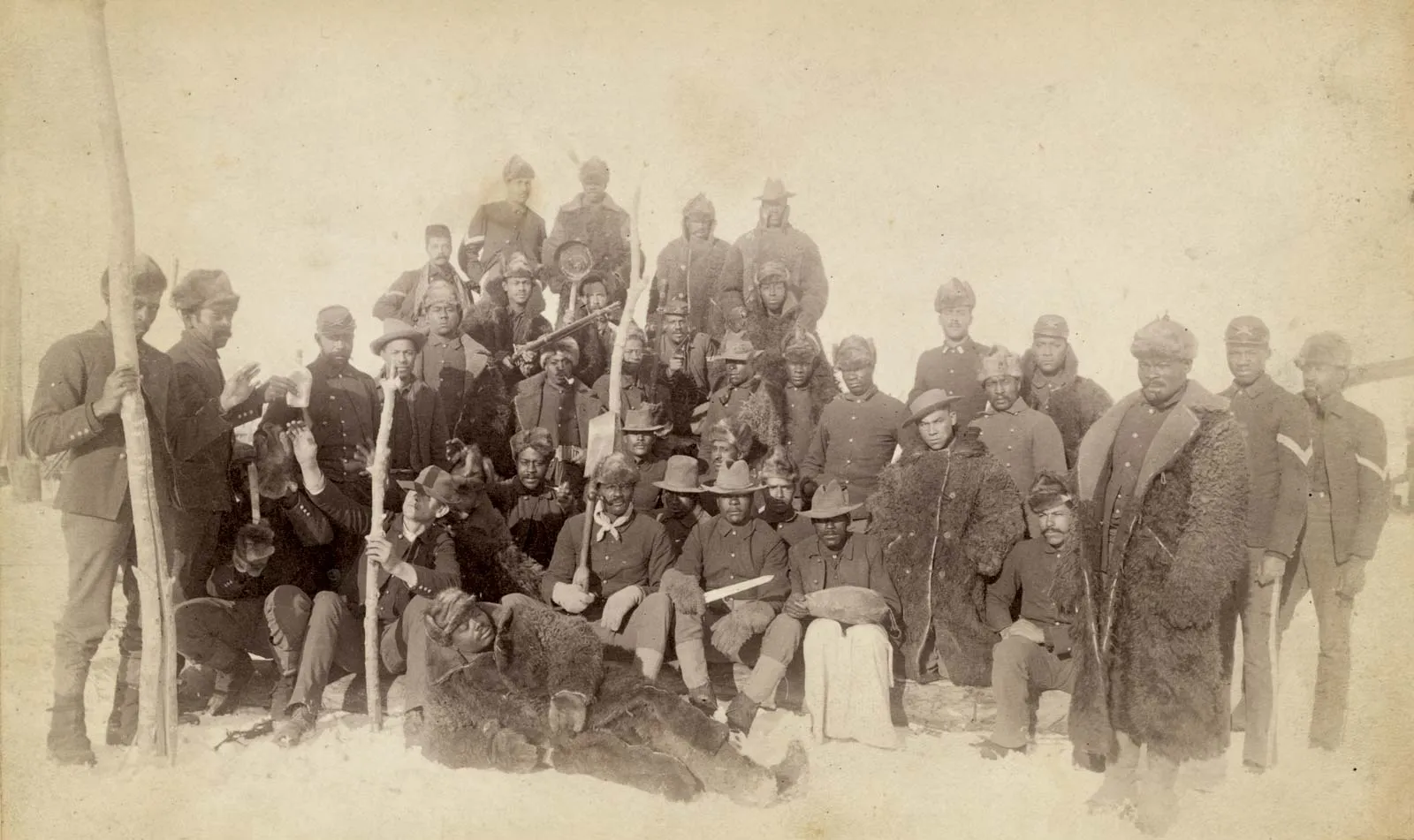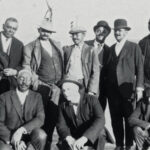The Buffalo Soldiers: A Legacy of Valor and Service
More News /Article
Buffalo soldiers of the 25th Infantry at Fort Keogh, Montana, 1890.
Credit: Gladstone Collection/Library of Congress, Washington, D.C. (Digital File Number: cph 3g06161)
The Buffalo Soldiers: A Legacy of Valor and Service
The story of the Buffalo Soldiers is one of courage, resilience, and unwavering service in the face of adversity. These African American soldiers, who served in the U.S. Army during the post-Civil War era and beyond, played a crucial role in the expansion and protection of the American frontier. Despite enduring racial discrimination, these men became symbols of honor, strength, and determination, earning their place in American military history.
Origins of the Buffalo Soldiers
The term “Buffalo Soldier” was first applied to African American soldiers who served in the U.S. Army after the Civil War. Following the war, the U.S. government sought to establish new military regiments to help patrol and secure the Western territories, which were expanding due to the settlement of the frontier. In 1866, the U.S. Congress passed the Army Reorganization Act, which created four all-Black regiments: the 9th and 10th Cavalry and the 24th and 25th Infantry. These soldiers, mostly newly freed African Americans, were tasked with enforcing law and order, protecting settlers, and battling Native American tribes who were resisting encroachment on their lands.
The origin of the “Buffalo Soldier” nickname is widely attributed to Native American tribes, particularly the Cheyenne, who reportedly gave the soldiers the moniker in admiration of their bravery and tenacity. The buffalo, a revered animal on the Great Plains, symbolized strength, endurance, and warrior spirit—qualities that the Native Americans saw in the African American soldiers.
The Role of Buffalo Soldiers on the Frontier
Buffalo Soldiers were instrumental in the U.S. Army’s efforts to control the American West. They fought in numerous battles and skirmishes with Native American tribes, including the Apache, Cheyenne, and Comanche. They also played significant roles in protecting settlers, building forts, and guarding supply trains. One of the most notable engagements was the Indian Wars, a series of conflicts between the U.S. government and Native American tribes in the late 19th century. Buffalo Soldiers were often in the thick of these battles, earning a reputation for bravery and steadfastness.
Beyond combat, the Buffalo Soldiers performed a variety of crucial duties. They helped construct telegraph lines, built infrastructure such as roads and forts, and provided protection for the expanding railroad system, ensuring that settlers and traders could move westward without fear of attack. Their contributions to the growth and development of the United States were integral to the country’s westward expansion.
Heroic Contributions and the Challenges They Faced
Despite their significant contributions, the Buffalo Soldiers faced immense challenges, primarily in the form of racial prejudice and discrimination within the Army. Although they were often the targets of racial hostility, they proved themselves as skilled soldiers and demonstrated unparalleled courage on the battlefield. Many earned medals of honor for their heroism, further cementing their reputation as some of the most capable soldiers of their time.
One of the most famous Buffalo Soldiers was Sergeant Major William H. Carney, who became the first African American to receive the Medal of Honor for his heroism during the Battle of Fort Wagner in 1863, before becoming part of the Buffalo Soldier regiments. Another notable figure, Colonel Charles Young, was the third African American to graduate from West Point and became the first African American national park superintendent, overseeing the Sequoia National Park.
Despite facing segregation, Buffalo Soldiers helped to prove that African Americans were just as capable of serving their country as any other group, playing a pivotal role in changing public perceptions of African Americans in the military.

Legacy and Recognition
While the Buffalo Soldiers are often remembered for their contributions to the military and to the growth of the American West, their legacy extends beyond the battlefield. These men served with distinction, and their perseverance in the face of racial discrimination and hardship paved the way for future generations of African Americans to serve in the military. The courage and honor they displayed helped to reshape the narrative of African American participation in American society.
Over time, the Buffalo Soldiers’ story has gained recognition. In 1992, the U.S. Congress established a National Buffalo Soldier Day, celebrated every July 28 to honor their legacy. The Buffalo Soldiers are also remembered in various museums and monuments, such as the Buffalo Soldiers National Museum in Houston, Texas, and the Buffalo Soldiers Monument at Fort Leavenworth, Kansas.
The Buffalo Soldiers in Popular Culture
The Buffalo Soldiers’ story has also been immortalized in popular culture, from books and films to songs and documentaries. Their role in shaping American history and their struggle for equality have made them an important part of the broader narrative of the African American experience. These soldiers, often depicted as courageous and dignified, have become symbols of resilience and perseverance.
Perhaps one of the most famous cultural references to the Buffalo Soldiers is the song “Buffalo Soldier” by Bob Marley, which helped bring their story to an international audience. The song describes the struggles and triumphs of the Buffalo Soldiers and links their legacy to broader themes of resistance and survival.
Conclusion
The Buffalo Soldiers embody a powerful and often overlooked chapter of American history. Their service to the nation, despite the challenges they faced, speaks to their courage, integrity, and commitment to justice. While the road to recognition was long, the Buffalo Soldiers’ contributions to the U.S. military and the American frontier remain a testament to the indomitable spirit of African American soldiers in the face of racial adversity. Their legacy continues to inspire pride and honor, reminding us of the often unheralded heroes who shaped the course of history.
More News /Article






